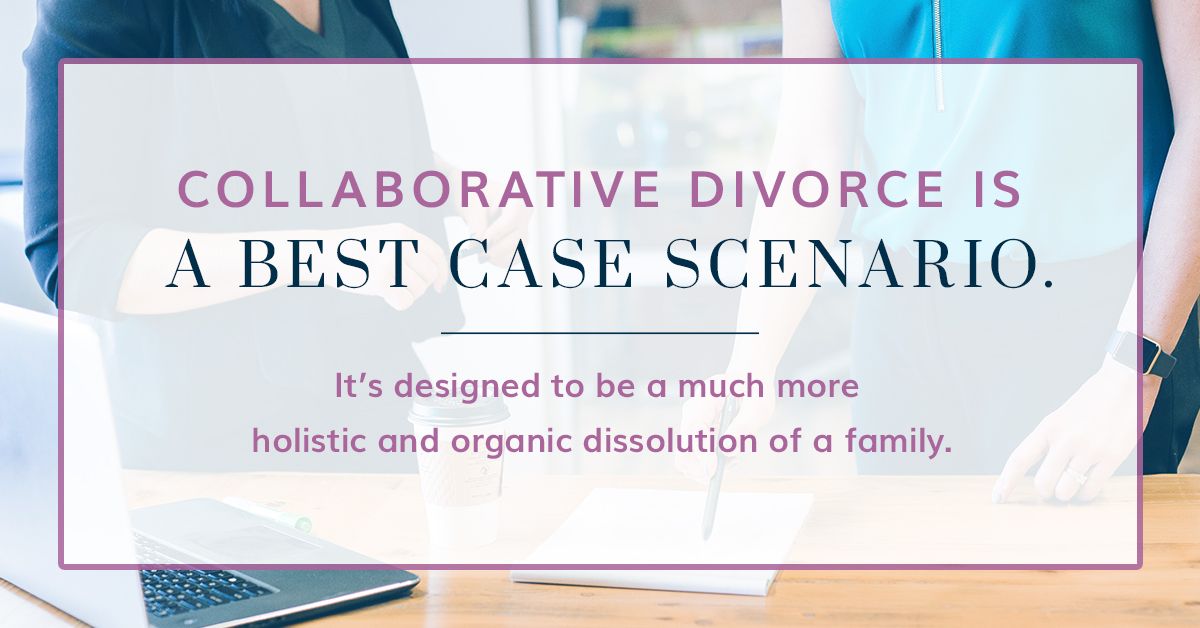
If you’re not interested in having your divorce follow a predictable pattern, it’s really smart to consider collaborative divorce.
After all, judges – and even attorneys – are often not that creative when it comes to options for dividing the assets, liabilities, and responsibilities of the parties. I can’t tell you how many times I’ve drafted agreements, or sat in court and listened to a judge spell out specific provisions, that were exactly the same as a million cases before.
It’s not that judges don’t want to be creative. It’s that their schedules (meaning, specifically, the court’s dockets) are so backed up that there’s not a lot of time dedicated to each case. And if you thought that litigation was expensive, just imagine how expensive it’d be if the judge spent MORE time on your case! Imagine if your attorney had to prepare witnesses, exhibits, and evidence regarding the division of each individual asset! No one could afford it.
Not only that, of course, but coming up with specific, tailored provisions would open a judge up to a lot of negative consequences. Imagine how often he’d hear that he favored one party over the other and that’s the reason for this unorthodox arrangement. Imagine how many people might then note appeals!
It gets unwieldy really quickly, which is why it’s such an untenable prospect. Attorneys can be a little more creative but, at the same time, we really lack the perspective and context that our clients have, which can limit our ability to suggest vastly different alternatives. We’re also sort of limited, in our heads, to what we know the court will do – which provides a sort of framework within which we all tend to work.
Collaborative divorce doesn’t work that way. There’s no framework. And it includes a pledge not to go to court – in fact, you have to hire new counsel if you can’t make it work and you end up litigating your case – which means that it doesn’t really matter to us, in a collaborative case, what a court might do.
As you can probably imagine, it’s a really freeing way to think about a divorce. No longer do we have to think about custody and visitation as only a few, specific scenarios (think: week on/week off, 4-3-3-4, every other weekend with two weeks in the summer, etc) but as something that could have as many different and varied arrangements as possible.
In fact, attorneys really aren’t the ones guiding the conversation towards settlement at all. In a collaborative case, we’re nearly silent. We help keep discussions flowing, try to help illustrate the advantages and disadvantages of different courses of actions, and, of course, write up the separation agreement at the end, once negotiations are successful. But we don’t offer nearly as many suggestions or try to resolve things “our” way at all.
It’s very much down to the specific clients, their unique concerns, and figuring out how to resolve them in a way that is advantageous to both. It – in my opinion – is truly a best case scenario divorce.
It includes – on top of the agreement not to go to court – agreements to treat each other with civility and respect and to share information freely. That means that, as we consider different options, we’ll figure out the costs associated with each, put it up on a board, and let everyone consider and ask questions about it.
In terms of structure, collaborative divorce is a series of meetings, both with your collaboratively trained attorneys and with your team of professionals (which often include divorce coaches for each party, a financial neutral, and a child specialist, if there are minor children involved). Different groups meet at different times, and sometimes all together, but it really is designed to be a much holistic and organic look at the dissolution of a family, which takes into account all the various needs and concerns of the parties involved.
Collaborative divorce has a really high success rate – over 99%. That’s not to say that it’s an easy process, because I’m fairly certain that divorce never is. But it’s much more fair, it includes many more opportunities for the parties to look at different alternative scenarios to the typical divorce provisions, and it takes into account all of the possible issues that the parties could run into. Though the team of professionals might include a different arrangement in different cases, it usually includes the players we mentioned – and that helps a lot, too. A divorce coach, especially, is particularly helpful to parties going through a divorce.
It’s not perfect – it is divorce, after all. It’s really not ideal for couples where there’s an uneven balance of power, or where the relationship was abusive. It’s much more like mediation than traditional negotiation or litigation, so you’ll want to be able to hold your own and offer your own input and considerations. Your collaborative attorney will be there to back you up, but ultimately you’ll need to be comfortable enough to come in with your own ideas, suggestions, and input for the collaborative experience to be as productive and successful as possible.
You’ll also both need to commit to the collaborative model in advance. Not every attorney is collaboratively trained, so not every attorney can do it. You’ll both have to specifically hire collaboratively trained attorneys to go through the process. That can be a tricky part, because you’ll both have to agree and buy in to the process.
In general, collaborative divorce is a great alternative to the traditional, adversarial, expensive divorce process. In our office, Sheera Herrell and Lori Michaud are collaboratively trained. For more information, give us a call at 757-425-5200, or visit our website.